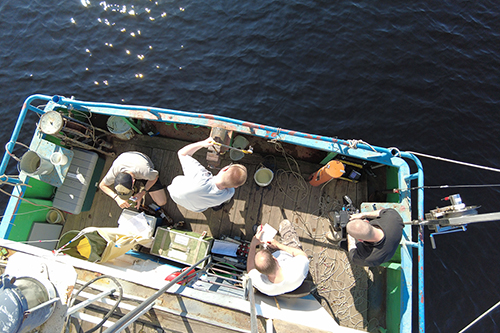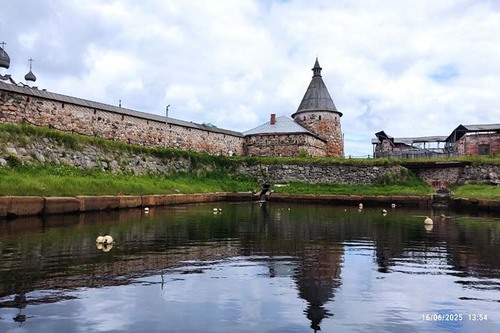In the second half of July, researchers from the Institute of Linguistics, Literature and History (ILLH) KarRC RAS undertook an expedition to the Tver Region. The scientists surveyed settlements in the Likhoslavl and Lesnoy Municipal Districts, as well as the Maksatikhinsky Municipal District. The purpose of the trip was to add content to the audio map on the VepKar language corpus platform, created by scientists from ILLH and the Institute of Applied Mathematical Research (IAMR) KarRC RAS. Anyone can use this resource as a full-fledged electronic dictionary, find their own settlement and listen to the dialect spoken by their ancestors.
The field team visited 11 villages and interviewed more than 50 informants, among them descendants of the Karelians whom researchers from Petrozavodsk had recorded back in the 1950s.
— These speech samples have already been uploaded to the VepKar speech corpus platform. However, Tver Karelia was only partially covered on the audio map. To supplement this database, we participated in an expedition competition of the Russian Geographical Society. The project “Filling the audio map of Karelian and Veps dialects” was supported by a grant. During the trip we recorded over 30 hours of Karelian speech samples on audio. In addition, we collected rich toponymic, folklore and ethnographic material, — told Irina Novak, Director ILLH KarRC RAS.
The scientists visited the Karelian farmstead in the village of Tolmachi, the school museum in the village of Lesnoye, the library in Gnezdov, and the House of Karelian Culture in the village of Stan, which is a member of the Association of the Most Beautiful Villages and Towns of Russia. Field team members interacted closely with local activists and discussed opportunities for further cooperation.
— We heard remarkable Karelian language in the Likhoslavl Districts and Maksatikhinsky District. We met informants who have a good command of the language, actively speak it among themselves, and easily switch from one language to another. The speakers have no language barrier, they did not need time to pick up words. In the village of Stan we were treated to a wonderful museum - the House of Karelian Culture. It struck us to the heart. The museum covers all aspects of people's life: lifestyle, culture, language. The situation in Lesnoy District is different, similar to what we find in some districts of Karelia. People who know Karelian understand the language, but answer in Russian. They no longer speak Karelian within their families, — shared Svetlana Nagurnaya, Head of Linguistics Section ILLH KarRC RAS.
There will be two more trips within this RGS project. In summer, scientists will travel to Prionezhye to collect samples of the Veps language. In the fall, researchers will interview descendants of Livvi and Ludic Karelians in central Karelia.
— During our trip to the Tver Region, we compiled a manual on collecting linguistic material. This technique is an important output of our scientific work, as the experience of compiling an audio map can be disseminated to other regions of the Russian Federation, — Irina Novak summed up.
On their visit to Tver Karelians scientists were joined by journalists from Vesti-Karelia program on Russia-1 TV channel, who are preparing a whole series of stories based on the results of the field trips.
News

July 4, 2024
VepKar audio map supplemented with Tver Karelian speech samples
Researchers from the Institute of Linguistics, Literature and History (ILLH) KarRC RAS are back from expedition to the Tver Region. The scientists recorded over 30 hours of Karelian speech samples and interviewed more than 50 informants. The trip was organized within the project “Filling the audio map of Karelian and Veps dialects”, supported by the Russian Geographical Society. Together with the scientists, Tver Karelians were visited by journalists from the Vesti-Karelia program of the Rossiya-1 TV channel.
Researchers from the Institute of Linguistics, Literature and History (ILLH) KarRC RAS are back from expedition to the Tver Region. The scientists recorded over 30 hours of Karelian speech samples and interviewed more than 50 informants. The trip was organized within the project “Filling the audio map of Karelian and Veps dialects”, supported by the Russian Geographical Society. Together with the scientists, Tver Karelians were visited by journalists from the Vesti-Karelia program of the Rossiya-1 TV channel.
See also:

July 28, 2025
Researchers monitor the state of Lake Onego under climate change and human impact
Staff of the Northern Water Problems Institute KarRC RAS are back from an expedition that covered larger bays and deep-water regions of Lake Onego. The multidisciplinary studies both provide new data on the wellbeing of the lake ecosystem through modern analysis methods and permit tracing the changes relying on over 60-year-long own observation series. Annual monitoring is especially important for evaluating the combined effect of climate change and human impact on the lake.
Staff of the Northern Water Problems Institute KarRC RAS are back from an expedition that covered larger bays and deep-water regions of Lake Onego. The multidisciplinary studies both provide new data on the wellbeing of the lake ecosystem through modern analysis methods and permit tracing the changes relying on over 60-year-long own observation series. Annual monitoring is especially important for evaluating the combined effect of climate change and human impact on the lake.

July 24, 2025
Karelian scientists assess the consequences of human impact on Solovki ecosystem
In 2025, KarRC RAS scientists continued field surveys in Blagopoluchiia Bay, Solovetsky Archipelago, White Sea. Two expeditions have already taken place – in winter and in summer, and one more is coming in August. Scientists explore the human impact on the archipelago’s nature, both in the bay waters and on adjacent land. They have detected an unusual ice structure, collected sediment cores to assess the pollution level, described the composition of the flora in the intertidal zone and the coastal meadows.
In 2025, KarRC RAS scientists continued field surveys in Blagopoluchiia Bay, Solovetsky Archipelago, White Sea. Two expeditions have already taken place – in winter and in summer, and one more is coming in August. Scientists explore the human impact on the archipelago’s nature, both in the bay waters and on adjacent land. They have detected an unusual ice structure, collected sediment cores to assess the pollution level, described the composition of the flora in the intertidal zone and the coastal meadows.



